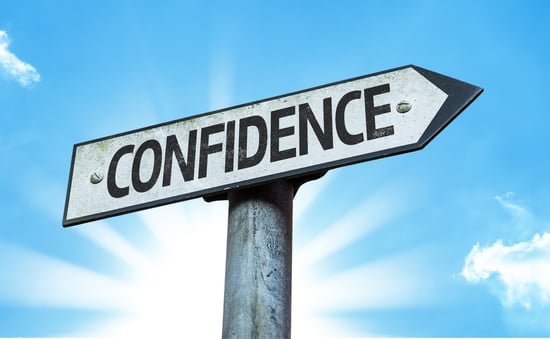 Having confidence as a teacher can improve your overall effectiveness as well as your wellbeing. Unfortunately, students can be quick to spot a lack of confidence, which can lead to issues with classroom management.
Having confidence as a teacher can improve your overall effectiveness as well as your wellbeing. Unfortunately, students can be quick to spot a lack of confidence, which can lead to issues with classroom management.
Everyone needs a confidence boost from time-to-time, whether you're a new teacher or have been gracing classrooms for years, especially when you meet new challenges, the education landscape shifts or you find you need to make changes to your teaching practice.
It's great when someone else gives you a pat on the back and an instant confidence boost, but you can't depend on others to keep you feeling confident. You are responsible for developing and nurturing your self-confidence.
Try these 6 tips to help you become a more confident teacher:
6 confidence boosting tips for teachers
1. Be prepared
Planning includes anticipating the challenges of particular classes, ensuring you're ready for lesson observations, potential situations that could arise and how you might deal with them. If your confidence has been knocked, try to put a little extra preparation time in. But… try to allow for some flexibility to avoid panicking if you need to change track part way through!
2. Walk tall
Body language says a lot! It affects how others see us, as well as how we see ourselves. In her TED Talk, social psychologist Amy Cuddy argues that "power posing" - standing confidently, even if we don't feel it - can boost your sense of self-confidence and possibly have an impact on our chances for success. People who are scared or unsure tend to slouch or cower, so walking tall will give you an air of confidence.
3. Your classroom, your rules
- Your lesson begins the moment your students set eyes on you. So if they're waiting outside your classroom, start the lesson then. Calmly and confidently demand the behaviour you expect from them before they come in, greet them at the door and set expectations straight away.
- If you start to feel panicky or that you're losing control, take a moment and breathe. Refer to your lesson plan and then once you feel more relaxed, try to gain control of the lesson calmly and authoritatively.
- Finally, if a class simply won't listen, don't try to shout over them. It will quickly frustrate and anger you and it won't encourage your class to listen. Instead try calmly standing still (despite how you may feel inside) and wait. Eventually the class will become quiet, it may not happen right away but be patient.
4. Don't fear criticism, use it
If you've been given some feedback that you deem to be negative, then use it as a tool to change. By acting on criticism instead of wallowing in it, you can turn a negative into a positive, helping you to not only build confidence but also really improve your practice.
5. Steer clear of Negative Nellie's
Do you find yourself surrounded by teachers who complain and moan about, well, everything? Although all teachers face challenges, it doesn't help to constantly focus on them in a negative way. If you notice that the people around you are always winging, change you surround yourself with. Look for those teachers who are trying to be and are positive about their job.
6. Realise your strengths
Last, but definitely not least, take some time to reflect on your practice and pull out the positives. Try filming your lesson for a really objective lens on your practice.
Whilst it might be uncomfortable at first, it really does help to overcome negative self-perceptions and recognise your strengths in the classroom. By reflecting on your teaching strengths and celebrating them you build a sense of self worth and belief, which ultimately leads to confidence.
Teacher confidence (efficacy): Why does it matter and how can SLT increase it?
Efficacy - or a teacher’s level of confidence in their abilities - can be highly influenced by past experiences or your current school culture. For example, a bad classroom experience or negative work environment can quickly diminish a teacher’s confidence.
Interestingly, seeing students grow and working in a collaborative environment can boost a teacher’s belief in their ability and improve performance. Research also suggests that teachers with a strong sense of self-efficacy tend to be better planners, more resilient through failure, and more open-minded and supportive with students.
Why teacher efficacy matters
According to Visible Learning for Teachers: Maximizing Impact on Learning by John Hattie, collective teacher efficacy has the greatest impact on student achievement - even higher than factors like teacher-student relationships, home environment, or parental involvement.
This might seem surprising, but it actually makes sense. A teacher who lacks confidence is less likely to push students, try new methods, or tackle difficulties.
Teacher efficacy also plays a role in teacher retention, helping to keep educators motivated and stay in profession.
So, what can you do to build teacher efficacy in your school?
How SLT can build teacher efficacy and confidence
1. Express appreciation
Teachers can often feel unappreciated and battered by the ever-changing education landscape and negative press. Creating a supportive positive environment within your school and telling your staff how much they're valued can really help to build a more confident culture. Make a habit of thanking your teachers, it's quick, easy and can make a real difference!
2. Give them leadership opportunities
Putting a teacher who lacks confidence in charge of something may seem like a disaster waiting to happen, but more often than not they will surprise you, rather than let you down. Don't delegate anything too daunting, but there are lots of projects and tasks that most people can handle. These opportunities encourage colleagues to step outside their comfort zone and achieve something new, which ultimately will build confidence.
3. Focus on strengths
Every teacher has strengths and it's essential to praise them. However it's also worth remembering that strengths still need to be honed and improved, just like weaknesses. One way to build confidence is to allow them to mentor a teacher who struggles in an area they excel in.
4. Provide effective professional development
Give teachers professional development opportunities that can act as a supportive guide for improvement. Most people are aware of their weaknesses but don't know how to fix them, which leads to a lack of confidence. Creating a culture that hinges around peer support and collaboration and providing time and tools for teachers to develop is great for building confidence and a stronger culture as a whole.
5. Acknowledge their workload
The demands of teaching can be overwhelming, from paperwork, lesson planning, marking and the many extracurricular activities teachers generally take on. When a leader doesn’t assist teachers who feel overwhelmed, they can lose their sense of efficacy. As a result the teacher’s practice can also be affected. Try to empathise with your teachers, listen when they ask for help, and do what you can to help them manage their responsibilities. Doing this will make your teachers more likely to feel valued and supported in getting things done.



Leave a comment:
Get blog notifications
Keep up to date with our latest professional learning blogs.